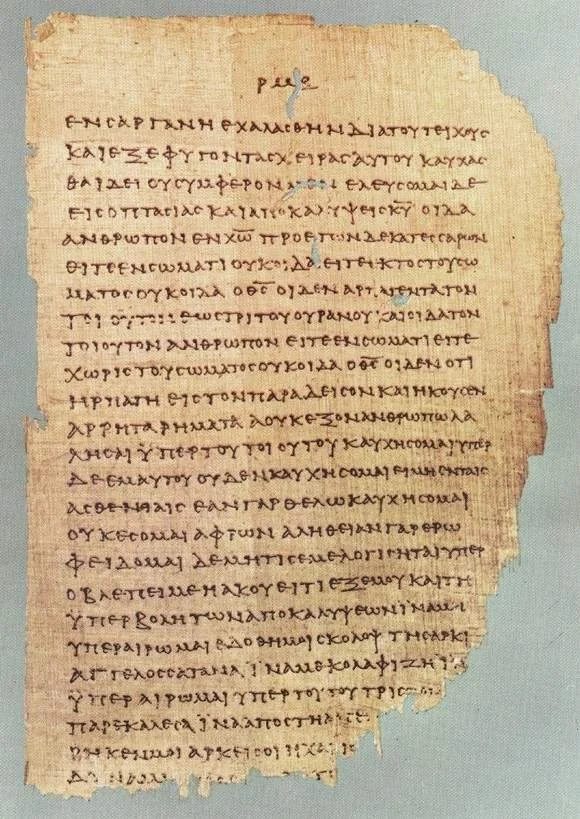What is Koine Greek?
What Is Koine Greek?
Koine Greek (pronounced Koy-nay) is the ancient Greek dialect in which the New Testament was originally written. The word Koine means "common," because it was the everyday language spoken by ordinary people across the eastern Mediterranean during the Hellenistic and Roman periods (roughly 300 BCE to 300 CE).
Unlike Classical Greek, which was the refined language of philosophers like Plato and historians like Herodotus, Koine Greek was simpler and more accessible. It spread through Alexander the Great's conquests and became the lingua franca of much of the ancient world, including Judea during the time of Jesus and the early church. This post contains some affiliate links for material that may help you.
Papyrus 46 (𝔓46) is one of the oldest surviving Greek manuscripts of the New Testament, dated to around 175–225 CE. It contains large portions of the Pauline Epistles, including Romans, 1–2 Corinthians, and Hebrews, written in early Koine Greek. The manuscript offers crucial insight into early Christian theology and textual transmission. Source. This is a passage from 2 Corinthians 11:33–12:9.
Why Is Koine Greek Important in the Bible?
The entire New Testament — including the Gospels, Paul’s letters, and Revelation — was originally written in Koine Greek. Understanding this language allows scholars and readers to:
Read Scripture in its original form
Examine nuances in grammar and wordplay
Translate key terms with more accuracy (e.g., logos, agape, ekklesia)
Additionally, many early Christian writings outside the Bible, including texts by early Church Fathers, were also written in Koine Greek. It serves as a bridge between ancient Jewish culture, Greco-Roman philosophy, and the emerging Christian message.
The Koine Greek Alphabet (with Transliteration)
Below is a table of the Koine Greek alphabet, including uppercase and lowercase letters, their names, and their transliterated English equivalents.
| Uppercase | Lowercase | Greek Name | Transliteration |
|---|---|---|---|
| Α | α | Alpha | a |
| Β | β | Beta | b |
| Γ | γ | Gamma | g |
| Δ | δ | Delta | d |
| Ε | ε | Epsilon | e |
| Ζ | ζ | Zeta | z |
| Η | η | Eta | ē |
| Θ | θ | Theta | th |
| Ι | ι | Iota | i |
| Κ | κ | Kappa | k |
| Λ | λ | Lambda | l |
| Μ | μ | Mu | m |
| Ν | ν | Nu | n |
| Ξ | ξ | Xi | x |
| Ο | ο | Omicron | o |
| Π | π | Pi | p |
| Ρ | ρ | Rho | r |
| Σ | σ / ς | Sigma | s |
| Τ | τ | Tau | t |
| Υ | υ | Upsilon | u / y |
| Φ | φ | Phi | ph |
| Χ | χ | Chi | ch |
| Ψ | ψ | Psi | ps |
| Ω | ω | Omega | ō |
How to Learn Koine Greek (Even Today)
Learning Koine Greek may sound intimidating, but it's quite doable — even if you don’t have a background in biblical languages. Here are some tips and resources to help:
Free Online Courses: Sites like Daily Dose of Greek, NTGreek.net, and YouTube channels provide beginner-friendly video lessons.
Grammar Books: Try "Basics of Biblical Greek" by William D. Mounce or "Learn to Read New Testament Greek" by David Alan Black. I labored over Mounce’s book in college and in seminary. Such a worthwhile language to learn to study in.
Flashcards and Apps: Use apps like Anki or Quizlet to memorize vocabulary and verb forms.
Is Koine Greek a Dead Language?
Technically, Koine Greek is a "dead" language in the sense that it's no longer spoken conversationally. However, it is very much alive in:
Liturgy: Greek Orthodox and other churches still use it in services
Academia: Biblical scholars, theologians, and seminarians read it regularly
Online Courses and Communities: There’s a growing movement to speak and learn Koine conversationally again
In other words, Koine may not be alive in the street—but it’s thriving in the classroom and the church.
Koine Greek vs Classical Greek: What’s the Difference?
| Feature | Koine Greek | Classical Greek |
|---|---|---|
| Time Period | 300 BCE – 300 CE | 500–300 BCE |
| Use Case | Daily speech, New Testament, documents | Literature, philosophy, formal speeches |
| Grammar | Simpler, more streamlined | More complex, formal, poetic |
| Audience | General population | Educated elite |
| Legacy | Bible, church liturgy, Christian theology | Greek philosophy, political theory, rhetoric |
Frequently Asked Questions (FAQ)
Q: What is Koine Greek?
A: Koine Greek was the common dialect spoken and written in the Hellenistic world and is the original language of the New Testament.
Q: How is Koine Greek different from Classical Greek?
A: Koine is simpler in grammar and vocabulary, used for daily life, while Classical was more formal and used by elite writers like Plato.
Q: Can I learn Koine Greek for free?
A: Yes! There are many online courses, YouTube channels, and open-source grammars to get you started.
Q: Is Koine Greek still used today?
A: While not spoken conversationally, Koine Greek is widely used in biblical studies, seminaries, and liturgical settings.
